Key takeaways:
- A web browser download allows users to retrieve files from the Internet, enhancing convenience and accessibility in daily digital life.
- File archiving is crucial for preserving important documents, providing a structured system to mitigate the risk of data loss.
- Effective archiving methods include using compression tools, cloud storage, and maintaining organized folder structures to enhance productivity.
- Establishing regular backup routines and utilizing version control significantly safeguard valuable data and improve file management experiences.
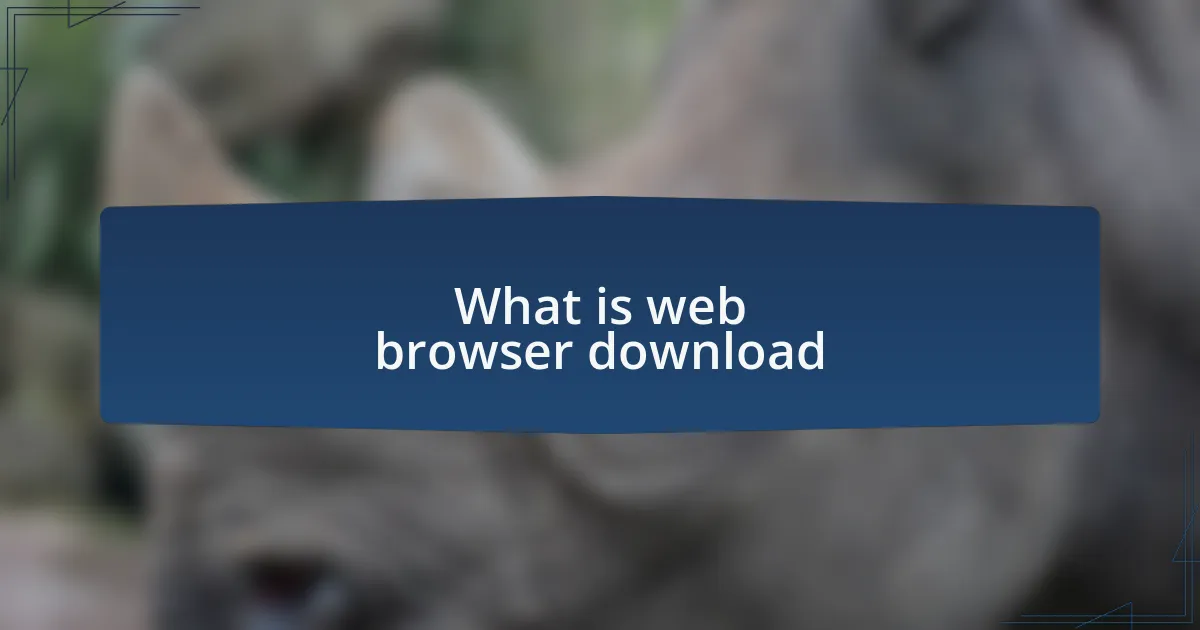
What is web browser download
When I think about web browser downloads, I remember the excitement of getting my first significant software application. It was a simple game, but the process of clicking that download button felt like unlocking a door to a new world of possibilities. Essentially, a web browser download is when you retrieve files, such as documents, images, or applications, from the Internet to your local device via a browser.
It’s interesting how this seemingly simple action combines technology and convenience. Have you ever stopped to think about how often we download files? I find myself downloading everything from productivity tools to recipes, often within minutes. Each click instantly brings valuable content directly to my fingertips, reflecting how our online experiences have evolved.
Moreover, the process itself is quite seamless; it’s almost magical how data travels through networks and lands into our devices. On a particularly hectic day, I once downloaded a crucial work presentation just before a meeting, feeling a rush of relief as it appeared in my downloads folder. With just a few clicks, I had access to what I needed, reminding me how web browser downloads simplify our digital lives daily.
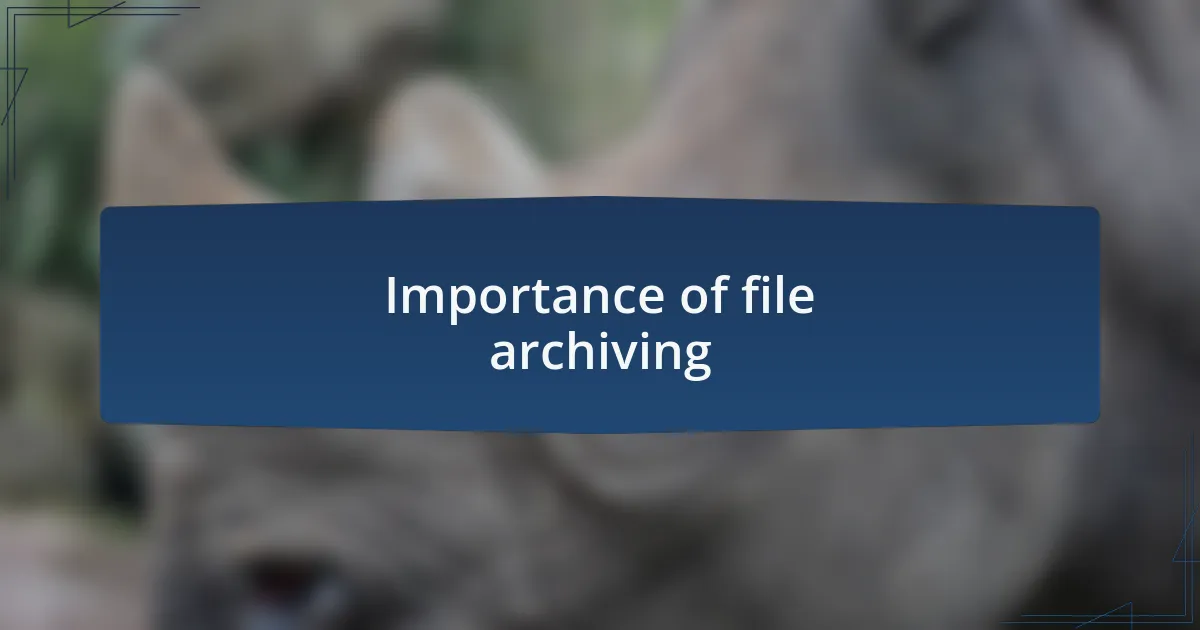
Importance of file archiving
When I think about file archiving, it instantly reminds me of the time I lost an important project due to a corrupted hard drive. All the work I had done felt like it vanished into thin air, which taught me a valuable lesson about the importance of safeguarding files. Archiving helps ensure that critical documents and data are preserved, mitigating the risk of loss that can impact both personal and professional aspects of our lives.
Then there are the moments when I discover old files tucked away in an archive—maybe a treasured family photo or a long-forgotten recipe. It’s like unearthing a little piece of my past, and it brings a sense of nostalgia. This emotional connection to archived files illustrates not just their practicality, but also their role in preserving memories and experiences.
Moreover, consider the efficiency that comes with having a well-organized archive. When I need to retrieve a document, it should take seconds, not minutes or hours! A structured archiving system saves time and reduces frustration, allowing me to focus on what truly matters—it’s a dramatic shift that amplifies productivity in our fast-paced world. How does that resonate with your own experiences?
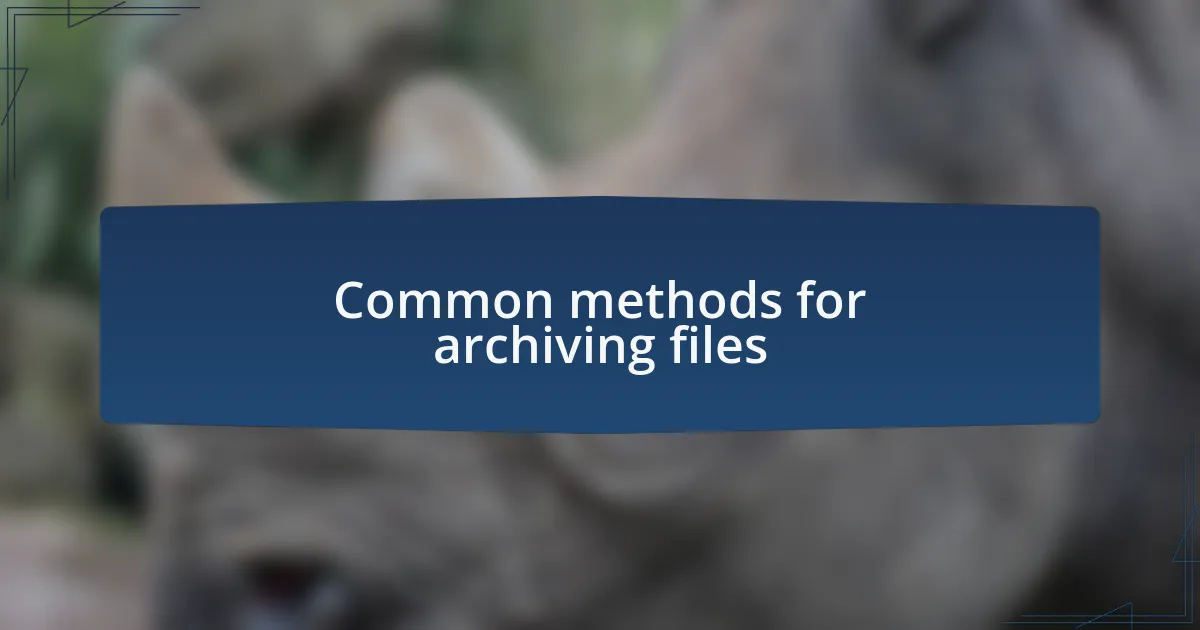
Common methods for archiving files
One effective method for archiving files is using compression tools like ZIP or RAR. I remember when I first started using a ZIP file after realizing it could bundle multiple documents into a single, manageable file. Not only did it save space, but I also felt a sense of accomplishment as all my related files came together neatly—like organizing a messy drawer and finding long-lost items.
Another common method is utilizing cloud storage services, which allow for easy access and sharing of archived files from anywhere. My experience with services like Google Drive has been transformative; I can effortlessly save important documents and access them on the go. It’s incredible how this level of accessibility has empowered me to collaborate more efficiently—ever tried sharing a photo album with family members using the cloud? It feels like bringing everyone together, even from a distance.
Finally, external hard drives offer a tangible, secure option for archiving files. I recall a time when I spent an entire weekend transferring my digital collection onto an external drive, feeling a sense of security with my work safely stored. The peace of mind that comes from knowing my files are not only organized but also physically separate from my computer is irreplaceable; have you experienced that reassuring feeling when you hold a hard drive full of cherished memories?
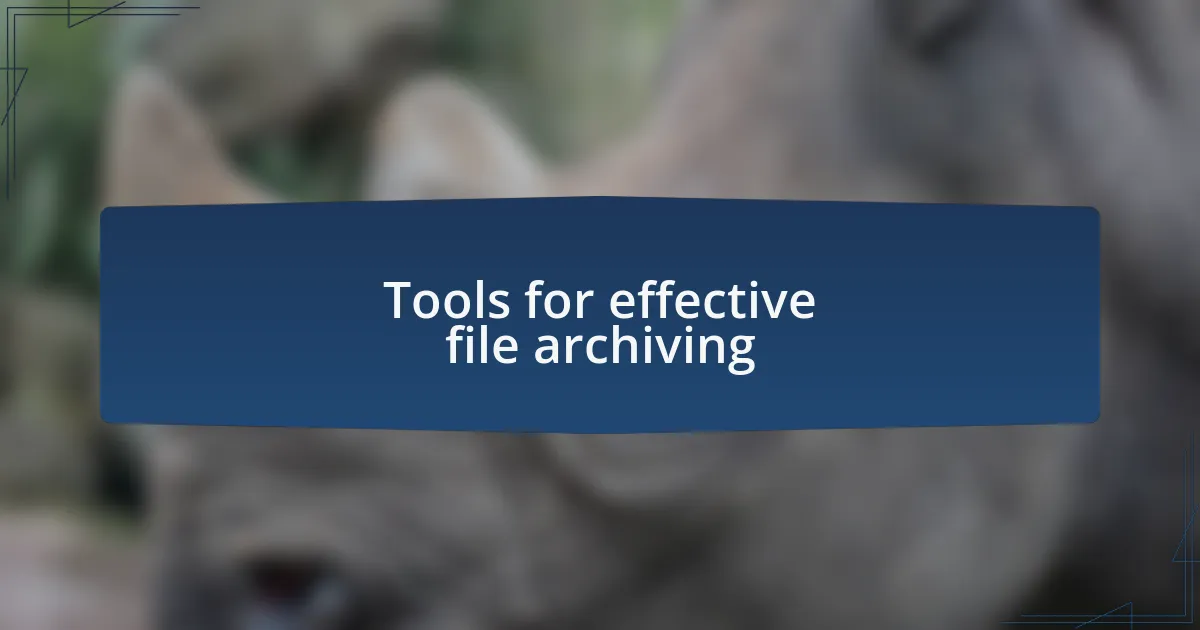
Tools for effective file archiving
Tools designed for effective file archiving can make a significant difference in how we manage digital clutter. I’ve often turned to tools like 7-Zip for creating archives because of its versatility and support for various formats. It’s almost therapeutic to compress a folder filled with images from a recent trip, knowing that all those memories are neatly packed away in one file—it feels like wrapping up a thoughtful gift.
Another invaluable tool I’ve found is an organized folder structure combined with file naming conventions. I learned this the hard way during a chaotic project where I couldn’t find essential files because of inconsistent naming. Now, I make it a point to use dates and descriptions in my file names, which elevates my efficiency; have you ever experienced that moment of clarity when you instantly find the document you need in seconds?
Lastly, I can’t overlook the benefits of dedicated archive software, like WinRAR or Archive Organizer. There was a time when I lost valuable data due to a mismanaged archive, which was a wake-up call. These programs allow me to encrypt and password-protect my files, adding a layer of security; I genuinely feel a sense of control knowing that my archived photographs are shielded from unintended access. Isn’t it reassuring to know your digital treasures are safe and sound?
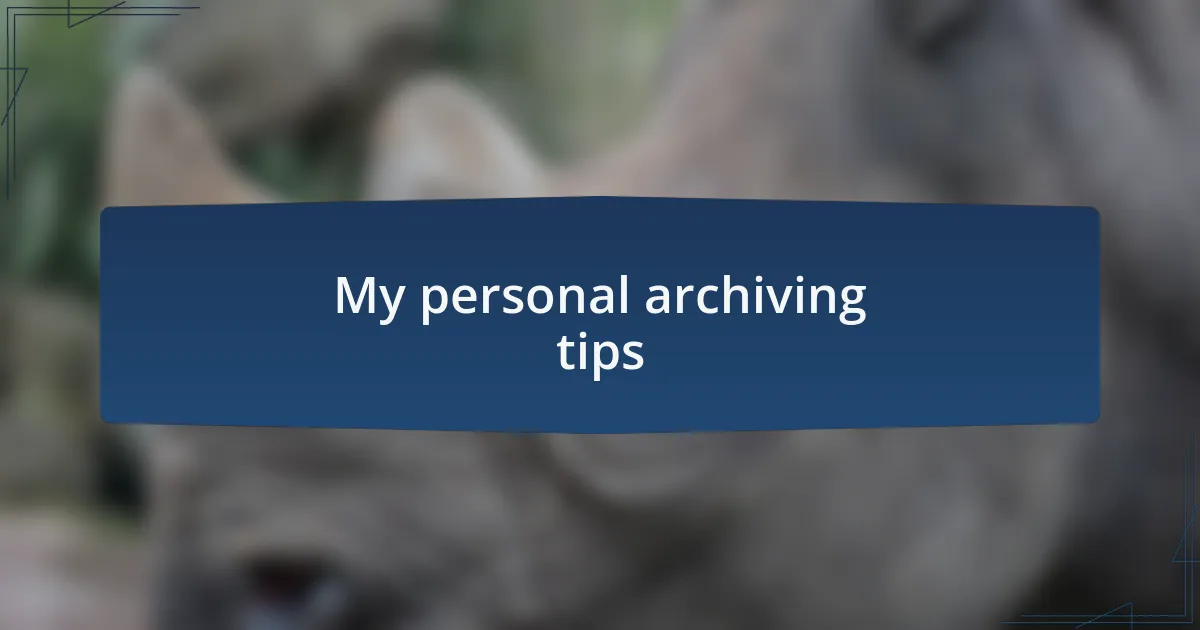
My personal archiving tips
One of my favorite archiving tips is to establish a routine for regular backups. I found myself in a stressful situation once when a hard drive crashed unexpectedly, taking with it countless cherished memories. Now, I set aside time every month to backup important files; it might seem like a chore at first, but knowing I’m preserving irreplaceable data brings me peace of mind. Have you ever realized how much you rely on your files until it’s suddenly too late?
Another strategy that straightened my archiving game drastically is keeping a dedicated ‘to-archive’ folder. Whenever I download files, I instantly move them here before organizing them later. I remember the chaotic scramble I faced while searching for a document in a cluttered downloads folder—now, that tidiness gives me a sigh of relief. It’s like having a stepping stone to a clearer, more organized digital space.
I also can’t stress enough the importance of using version control for important documents. Early in my career, I made the mistake of overwriting crucial drafts without keeping previous versions. Now, I use services like Google Docs that automatically save different versions; this way, I feel secure knowing that I can revert to an earlier draft if needed. It’s liberating, don’t you think, to have that flexibility?

Lessons learned from my experiences
When I started archiving files, I didn’t realize how crucial metadata could be until I spent hours searching for an old project file. It was during that frustrating hunt that I learned the power of tagging my documents effectively. Now, I take a moment to add relevant keywords or notes, and it has saved me countless hours of digging through endless folders—who else has felt that stress of a missing file?
Another lesson came when I attempted to archive everything without a clear structure. My files quickly became a jumbled mess, and accessing them became overwhelming. By implementing a hierarchical folder system, I reduced my retrieval time dramatically. It feels so much better to navigate my digital landscape without feeling lost—can you relate to that chaotic experience?
Lastly, I learned the hard way about the importance of reviewing my archived files regularly. There was a time I stored dozens of outdated files, thinking I might need them again. But, when I finally took the time to declutter, I realized how liberating it was to let go of what no longer served me. It’s interesting how sifting through old material can actually remind us of growth and change—have you ever experienced that feeling?